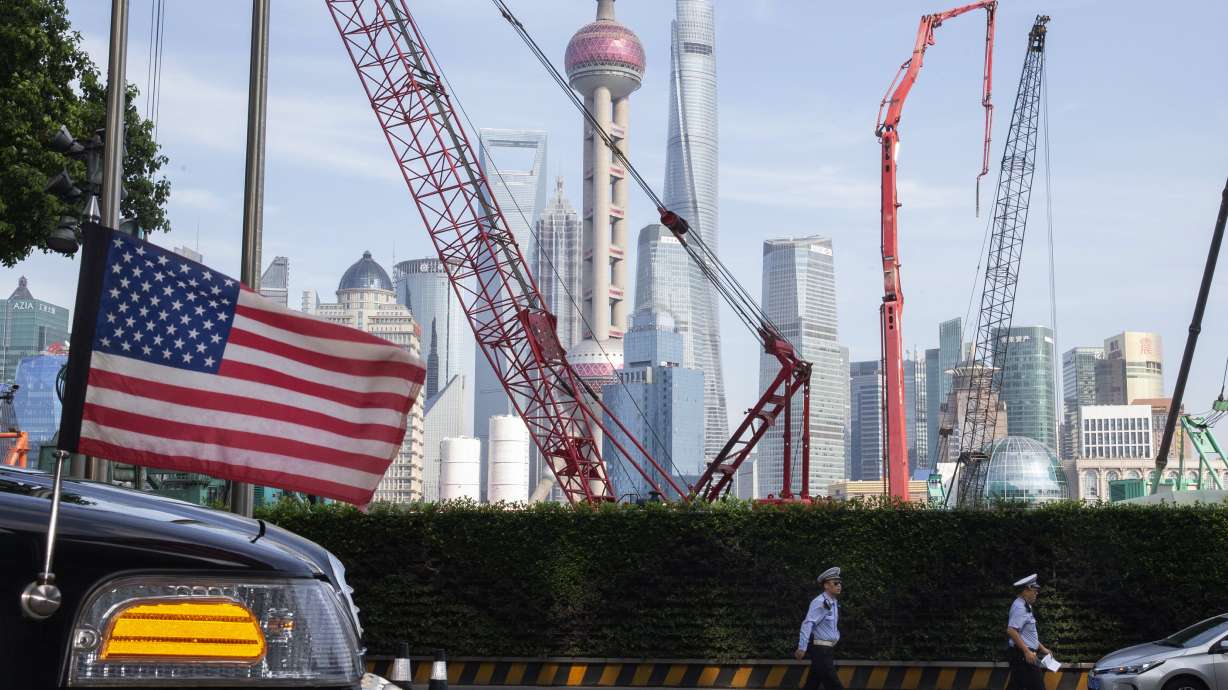Estimated read time: 5-6 minutes
This archived news story is available only for your personal, non-commercial use. Information in the story may be outdated or superseded by additional information. Reading or replaying the story in its archived form does not constitute a republication of the story.
SALT LAKE CITY — "China is now the world's largest economy."
How far away are we from that headline?
Experts have pegged the date as arriving in the next 10 years or so, and the likely dethroning of the U.S. economy, which has held the global top spot since the late 19th century, will mark a seismic shift of power that's been decades in the making.
But what steps can U.S. businesses and public policymakers take right now, as China elevates both its internal repression and external aggression, to stay viable in a fast-changing world?
Addressing those issues and providing insight and tactical guidance is at the heart of Thursday's China Challenge Summit, presented by World Trade Center Utah and Utah Valley University.
Organizers are billing the daylong event as an "unprecedented gathering of the nation's top geopolitical thinkers, policymakers and business executives to provide U.S. businesses, government leaders and civil society with a deeper understanding" of the most critical issues, including:
- China's geopolitical strategy and U.S. foreign policy toward China.
- China's economic, trade, business and foreign policies.
- How U.S. businesses and policymakers should respond to these challenges.
The extensive list of speakers and presenters include Jon Huntsman,Jr. former Utah governor and U.S. ambassador to China and Russia; Nicholas Burns, current U.S. ambassador to China; former deputy national security adviser Matt Pottinger; Glenn Tiffert, research fellow at the Hoover Institution; Lingling Wei, chief China correspondent at The Wall Street Journal; Mary Lovely, senior fellow at the Peterson Institute for International Economics; Damien Ma, managing director at the Paulson Institute; Miles Hansen, president and CEO of World Trade Center Utah; Astrid Tuminez, president of Utah Valley University; and many more.
How fast has China been able to assemble this new economic might?
In 1960, China's gross domestic product was about 11% of the U.S. GDP and now that figure is hovering at about 70%. China has been the biggest global exporter since 2009 and, in 2013, surpassed the U.S. to become the world's largest trading country.
Hansen said that in virtually every business sector, in Utah and across the country, China has become recognized as the No. 1 challenge on a wide variety of issues. And, thanks to a growing disregard by nationalist nations for global trade and cooperation rules established after World War II, countries like China and Russia have opted, instead, to "crash through the rules" to achieve their objectives.
"For the past 40 years, there's been the belief in the U.S. that as we worked hard to help China develop its economy it would lead to a moderation of China's domestic policy, increased respect for human rights, improved foreign policy ... and free and fair markets," Hansen said. "But over the past decade, really, what we've seen is … that is simply not happening.
"What we have seen is China becoming more repressive, more regressive. What they're really working to do is make the world dependent on China ... while also making itself independent from the rest of the world."
The last few decades have also seen a rising power and fiscal imbalance between the U.S. and China as the country of 1.4 billion continues to grow and solidify its economic might.
A recent analysis from Harvard Kennedy School's Belfer Center for Science and International Affairs included these findings:
- China's sustained "miracle economic growth" over the past four decades at an average rate four times that of the U.S., which has redefined the global economic order.
- When measured by the traditional yardstick — market exchange rate — since 2000, China's GDP has soared from $1.2 trillion to $17.7 trillion. On the current trajectory, it will overtake the U.S. within a decade. By the yardstick both the CIA and the IMF judge to be the best metric for comparing national economies — purchasing power parity — China has already surpassed the U.S. to become the world's largest economy.
- China has established itself as the most essential link in the world's critical global supply chains.
- China has replaced the U.S. as the primary engine of global economic growth. Since the 2008 financial crisis, one-third of all growth in the world's GDP has occurred in just one country: China.
- In 2020, China supplanted the U.S. as the home to the largest number of the most valuable global companies on Fortune's Global 500 for the first time. It has also rivaled the U.S. as the leading country in attracting foreign investment and is neck and neck with the U.S. in gross R&D investments.
Organizers say the China Challenge Summit will provide tools, data and consultation aimed at guiding businesses and policymakers on how to best navigate these formidable, and ongoing, shifts in global economics.
Morning presentations will include talks focusing on China's global influence and political strategies; the evolution of U.S. diplomacy and foreign policy; China's economic might and trade policy; and business intelligence for navigating China.
Afternoon breakout sessions will cover a wide variety of topics including:
- China's domestic economy and global disruption.
- China's national rejuvenation and strategic ambitions.
- Risks and rewards of doing business in China.
- Navigating a new era of economic statecraft.
- Trade winds and viable alternatives to China.
- Global competition in high technology and innovation.
Additional details and how to attend, in-person or virtually, Thursday's China Challenge Summit at UVU's Noorda Center for the Performing Arts can be found at chinachallengesummit.com.
Deseret News' parent company, Deseret Management Corp., is a financial sponsor of the China Challenge Summit.









